The Hidden Wiki stands as a portal to a unique and obscured facet of the internet known as the Dark Web. This term refers to a collection of websites that are not indexed by traditional search engines and can only be accessed through specialized software and configurations. At its core, the Hidden Wiki serves as a directory, providing links to various websites and resources within the Dark Web.
Characteristics of the Hidden Wiki
Directory of Links: The Hidden Wiki functions as a collection of hyperlinks, organizing and categorizing websites and services available on the Dark Web. It acts as a starting point for users seeking to explore this encrypted realm.
Access to Diverse Content: Within the Hidden Wiki, users can find links to a wide range of websites, including forums, marketplaces, blogs, information repositories, and various services. These websites may cover topics ranging from privacy and cybersecurity to less legal or illicit offerings.
Anonymity and Encryption: To access the Hidden Wiki and other Dark Web sites, users typically use specialized software like the Tor browser. This browser enables users to browse anonymously by routing their internet traffic through a series of encrypted nodes, enhancing privacy and anonymity.
Varied Content Quality: Due to the lack of regulation, content on the Hidden Wiki can vary significantly in terms of legitimacy, accuracy, and legality. While some links may lead to valuable and legal resources, others may offer prohibited goods or services.
Purpose and Controversy
The Hidden Wiki, like the Dark Web itself, is a subject of fascination and controversy. Its purpose extends beyond merely providing access to hidden websites; it serves as a gateway for those seeking privacy, uncensored information, and alternative platforms for communication. However, the unregulated nature of the Dark Web, including the Hidden Wiki, means it can also host illicit activities, raising concerns about legality and ethics.
A Portal to the Enigmatic Dark Web
In essence, the Hidden Wiki acts as a guidebook, offering users a glimpse into the obscured corners of the internet. It provides access to a myriad of websites and services that remain hidden from standard search engines and browsers. Navigating the Hidden Wiki requires caution and discernment due to the diverse nature of the content it links to. Understanding its role as a directory within the Dark Web landscape is essential for those curious about exploring this encrypted realm.
How to Use the Hidden Wiki?
Using the Hidden Wiki involves delving into the enigmatic realm of the Dark Web. To navigate this encrypted landscape safely and responsibly, here are steps to access and utilize the Hidden Wiki:
1. Secure Access
a. Obtain the Tor Browser:
The Tor browser is crucial for accessing the Dark Web, including the Hidden Wiki. Download and install the Tor browser from the official website.
b. Employ a VPN:
For an additional layer of security, consider using a Virtual Private Network (VPN) alongside the Tor browser to mask your IP address and enhance anonymity.
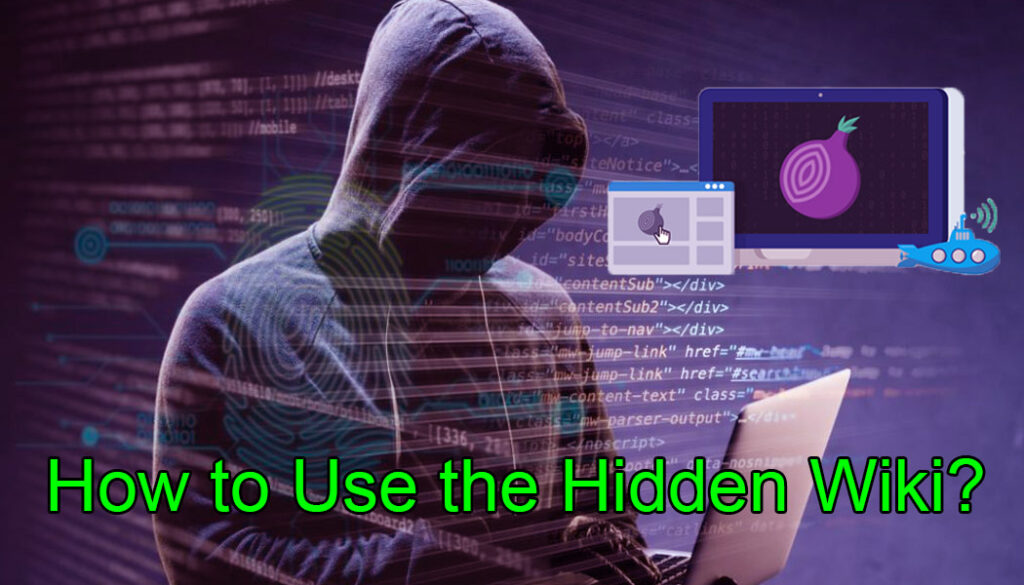
2. Accessing the Hidden Wiki
a. Enter the .onion URL:
After launching the Tor browser, enter the .onion URL associated with the Hidden Wiki. These URLs are specific to the Dark Web and end with “.onion.”
b. Verify Links Carefully:
Once on the Hidden Wiki, exercise caution when clicking links. Verify the reputation of websites and services before accessing them to avoid potential scams or malicious content.
3. Ensuring Anonymity
a. Protect Personal Information:
Avoid sharing any personal information while browsing the Hidden Wiki. Anonymity is crucial for safeguarding your identity on the Dark Web.
b. Use Encrypted Communication:
Employ encrypted messaging tools, such as PGP (Pretty Good Privacy), for secure communication within the Dark Web. This ensures that your conversations remain private.
4. Exercising Caution
a. Avoid Illicit Activities:
Refrain from engaging in illegal activities or accessing sites offering illegal services. Respect legal boundaries and navigate the Hidden Wiki responsibly.
b. Verify Legitimacy:
Be wary of suspicious offers or links. Verify the legitimacy of websites and services before interacting with them to mitigate potential risks.
5. Exit and Security
After exploring the Hidden Wiki, clear your browsing history, cookies, and cache within the Tor browser to minimize any trace of your activities.
a. Clear Browsing Data:
b. Disconnect Securely:
Disconnect from the Tor network securely by closing the Tor browser entirely, ensuring that your connection to the Dark Web is terminated.
Navigating with Caution
Using the Hidden Wiki demands a cautious approach and a thorough understanding of the security measures required to navigate the Dark Web safely. By following these steps and exercising vigilance, users can explore the Hidden Wiki while prioritizing their online privacy and security. However, it’s essential to remember that the Dark Web poses inherent risks, and responsible navigation is paramount to mitigate potential threats.
What Types Of Information Available on the Hidden Wiki?
The Hidden Wiki, residing within the encrypted realm of the Dark Web, hosts a broad spectrum of information and services, covering various categories. While the content available on the Hidden Wiki is extensive and diverse, here are some of the common types of information you might encounter:
1. Privacy and Security Resources
– Guides and Tutorials:
Information on privacy-enhancing tools, encryption methods, and tutorials on safeguarding digital identities.
– Cybersecurity Insights:
Resources discussing cybersecurity threats, vulnerabilities, and strategies to protect against online risks.
2. Marketplaces and Commerce
– Goods and Services:
Links to marketplaces offering a range of products, from legal items to items of questionable legality, including drugs, software, and more.
– Financial Services:
Services related to cryptocurrencies, exchanges, and financial transactions conducted within the Dark Web.
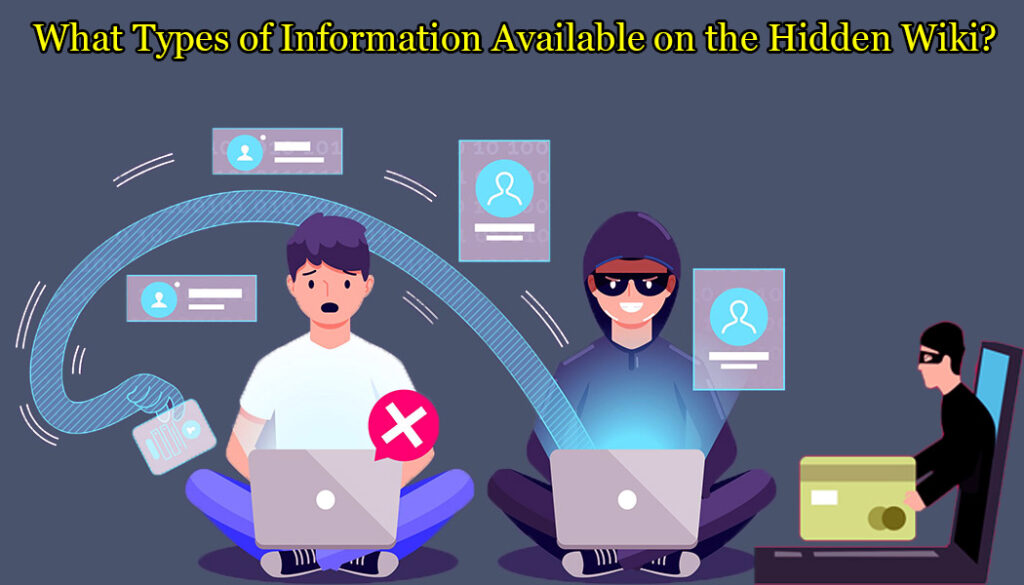
3. Forums and Communities
– Discussion Forums:
Platforms where users engage in discussions on various topics, including technology, politics, privacy advocacy, and more.
– Support Groups:
Communities provide support and advice on a range of subjects, from mental health to technology-related queries.
4. Whistleblower Platforms
– Secure Platforms:
Links to platforms designed for individuals to share sensitive information anonymously, promoting transparency and accountability.
– Leaks and Exposes:
Websites dedicated to leaks, expose information related to government activities, corporate malpractice, and more.
5. Educational Resources
– Alternative Learning:
Resources offering educational content, tutorials, and courses on various subjects, catering to diverse learning interests.
6. Uncensored Media and News Outlets
– Alternative News Sources:
Websites provide news and information that might not be readily available or censored on the surface web.
7. Ethical and Legal Content
– Privacy Advocacy:
Platforms supporting digital rights, advocating for online privacy, and discussing the impact of surveillance.
– Legal Information:
Resources providing legal advice, discussions on legal matters, and access to legal documentation.
A Diverse Array of Resources
The Hidden Wiki offers a broad range of information and services, reflecting the diversity and complexity of the Dark Web. However, it’s important to note that while the Hidden Wiki contains valuable resources, it also hosts content of varying legality and ethics. Navigating the Hidden Wiki requires discretion and caution to ensure safe exploration and avoid potential risks associated with the Dark Web’s unregulated environment.
Assessing the Potential Risks of the Hidden Wiki
The Hidden Wiki, residing within the cryptic realm of the Dark Web, presents a nuanced landscape that can pose risks to individuals who navigate it without caution. While not inherently harmful, the Hidden Wiki’s unregulated nature and the content it links to can potentially expose users to various risks and dangers.
Understanding the Risks
1. Exposure to Illegal Content:
The Hidden Wiki provides links to a diverse array of websites, some of which offer illegal goods, services, or content. Users might inadvertently encounter illicit material, exposing them to legal consequences.
2. Scams and Fraud:
Scammers often lurk within the Dark Web, offering fake products or services. Users might fall victim to fraudulent schemes or phishing attempts, leading to financial loss or compromise of personal information.
3. Malware and Cyber Threats:
Some websites linked through the Hidden Wiki might host malware or malicious content. Clicking on suspicious links could result in malware infections or compromise of devices and personal data.
4. Potential Psychological Impact:
Exposure to explicit or disturbing content, which can be prevalent on the Dark Web, might have adverse psychological effects on individuals.
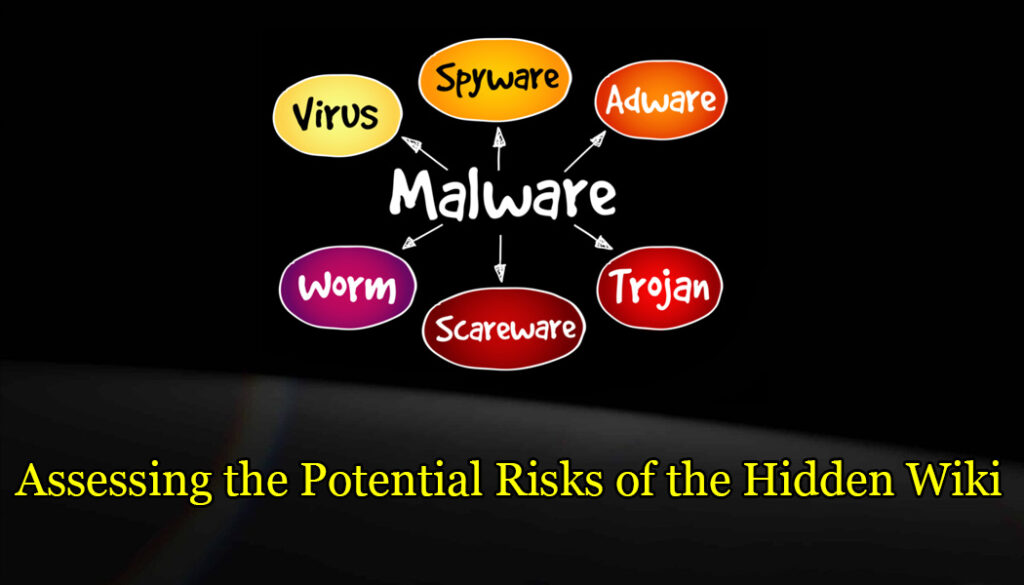
Mitigating Risks and Safe Navigation
1. Exercise Caution:
Approach the Hidden Wiki with extreme caution. Verify the legitimacy of websites before accessing them and avoid clicking on suspicious or untrustworthy links.
2. Protect Personal Information:
Avoid sharing any personal or identifiable information while exploring the Dark Web. Anonymity is crucial for safeguarding one’s identity.
3. Use Security Measures:
Employ protective measures such as using the Tor browser, a VPN, and antivirus software to enhance security and privacy.
4. Educate Yourself:
Understand the risks associated with the Dark Web. Staying informed about potential threats is vital for safe navigation.
Navigating the Hidden Wiki Prudently
While the Hidden Wiki itself might not be harmful, the content it links to and the unregulated environment of the Dark Web pose risks to individuals who venture into this encrypted realm. By exercising caution, employing security measures, and being discerning in their interactions, users can minimize potential dangers associated with exploring the Hidden Wiki. However, it’s crucial to understand that the Dark Web operates outside the bounds of traditional regulations, and navigating it requires a vigilant and responsible approach to mitigate risks effectively.
Some of the Good and Notable Sites on the Hidden Wiki are Worth Exploring
Within the labyrinthine corridors of the Hidden Wiki lies a myriad of websites and services, some of which offer valuable and legitimate content. While navigating the Dark Web demands caution, here are a few categories of sites that are considered reputable and can provide informative or beneficial content:
1. Privacy and Security Resources
– Tor Project:
The official website of the Tor Project offers information about the Tor browser and tools to enhance online privacy.
– PGP Tools:
Platforms providing guidance on Pretty Good Privacy (PGP) encryption, fostering secure communication.
2. Forums and Communities
– Whistleblower Platforms:
Websites like SecureDrop or WikiLeaks, are designed to facilitate anonymous leaks and expose sensitive information for transparency.
– Tech and Privacy Forums:
Communities dedicated to technology, cybersecurity, and privacy advocacy, fostering discussions and sharing valuable insights.
3. Educational Resources
– Library Genesis:
An online repository offering access to a vast collection of eBooks, academic papers, and educational materials.
– Hidden Answers:
A Q&A platform where users can seek and provide information on various subjects, from technical queries to advice.
4. Legal and Ethical Platforms
– ProPublica:
A reputable investigative journalism platform dedicated to producing investigative journalism in the public interest.
– Rights Advocacy Groups:
Websites advocating for digital rights, promoting privacy, and cybersecurity awareness.
5. Alternative News and Media
– Cryptome:
A platform hosting a collection of documents and articles focusing on freedom of speech, privacy, and surveillance.
– Non-Mainstream News:
Websites provide alternative news perspectives that might not be readily available on the surface web.
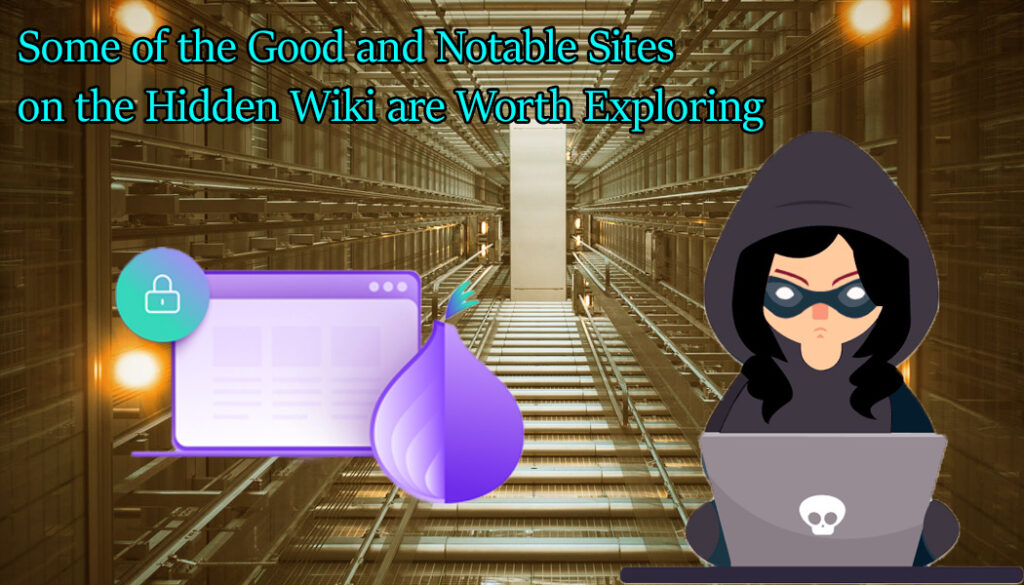
Valuable Resources amidst the Dark Web
While the Dark Web, including the Dark Wiki, harbors a mix of legal and illegal content, there are notable sites that offer informative, educational, or ethical resources. These sites cater to various interests, including privacy, security, education, and alternative media. However, users must exercise extreme caution, verify the legitimacy of sites, and prioritize their safety while exploring the Hidden Wiki or any Dark Web links.
Things that are not true about the Hidden Wiki
The Dark Web, often shrouded in mystery and misinformation, carries numerous misconceptions. Let’s debunk some prevalent myths and clarify what isn’t true about this encrypted corner of the internet:
1. It’s Exclusively for Illegal Activities
Reality: While the Dark Web does host illicit marketplaces and content, not all activity within this realm is illegal. Many users navigate the Dark Web for privacy, security, uncensored communication, and access to legitimate resources.
2. Everyone on the Dark Web is a Criminal
Reality: The Dark Web houses a diverse user base, including journalists, researchers, privacy advocates, and individuals seeking anonymity. Not all users engage in illegal activities; many explore the Dark Web for lawful purposes.
3. It’s Completely Anonymous and Safe
Reality: While the Dark Web provides a level of anonymity, it’s not foolproof. Users’ identities can be compromised through various means, and risks of scams, malware, and cyber threats persist. Safe navigation demands caution and robust security measures.
4. It’s Impossible to Track Activities
Reality: Law enforcement agencies and cybersecurity experts actively monitor the Dark Web. While Tor and encryption offer privacy, users can still be identified through vulnerabilities or illegal activities, leading to legal repercussions.
5. All Information on the Dark Web is Untrustworthy
Reality: While there’s a mix of accurate and misleading content, several legitimate resources within the Dark Web offer valuable information. For instance, whistleblowing platforms or privacy-focused communities share credible insights.
6. It’s Easy to Access and Explore
Reality: Accessing the Dark Web requires specific software, configurations, and precautions like the Tor browser and VPN. Navigating this encrypted terrain demands technical knowledge and a vigilant mindset.
7. The Dark Web is a Single, Homogeneous Entity
Reality: The Dark Web comprises diverse websites, forums, and communities, each with its own purposes and content. It’s not a singular entity but a decentralized space hosting various platforms.
Dispelling Misconceptions
The Dark Web, including its most well-known aspect, the Dark Wiki, is a complex and multifaceted environment often misunderstood due to prevalent misconceptions. While it’s crucial to acknowledge its potential risks, it’s equally essential to recognize its diverse user base and the spectrum of content, some of which serves legitimate purposes. Understanding these truths is vital for fostering a balanced perspective and approaching the Dark Web with awareness and discernment.
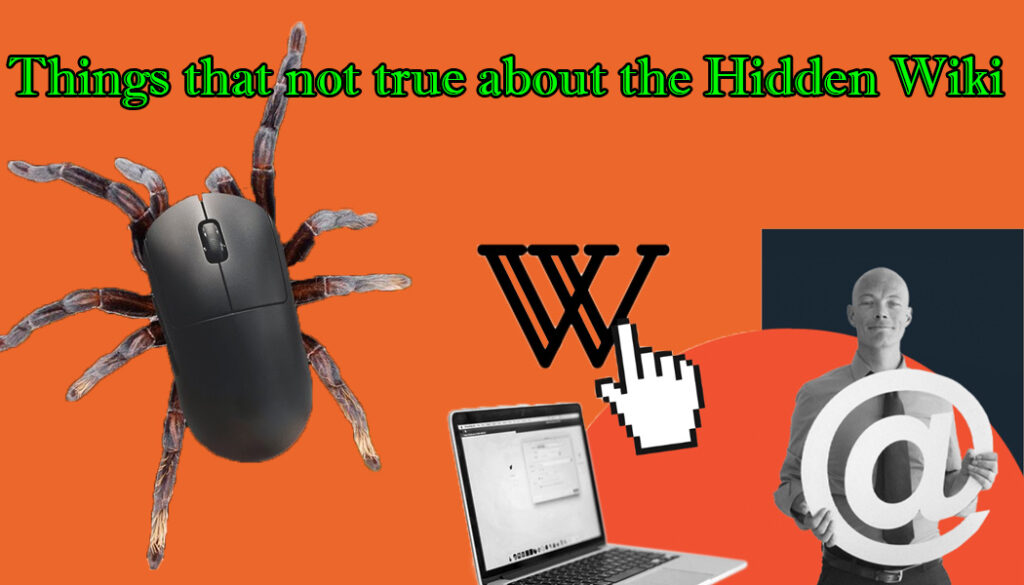
The Relationship between Dark Web Sites and the Hidden Wiki
The Dark Web comprises a network of encrypted websites that aren’t indexed by traditional search engines, offering varying content, legality, and purposes. The Dark Wiki, on the other hand, acts as a gateway or directory to these Dark Web sites. However, it’s essential to clarify the connection between Dark Web sites and the Hidden Wiki:
1. Hidden Wiki as a Directory
Gateway to Dark Web Sites: The Hidden Wiki serves as a starting point, providing users with links to various Dark Web sites, forums, marketplaces, and resources.
Organizational Tool: It categorizes and organizes links, facilitating easier access to different categories of content available within the Dark Web.
2. Independence of Dark Web Sites
Varied and Independent: Dark Web sites operate independently of the Hidden Wiki. They establish their presence and don’t require inclusion within the Hidden Wiki to function or operate.
Diverse Origins: Sites on the Dark Web can be accessed without being listed on the Dark Wiki. Many sites are discovered through other means, and their visibility doesn’t hinge on being linked through the Hidden Wiki.
3. Dynamic Nature of the Hidden Wiki
Ever-Evolving Directory: The Hidden Wiki isn’t static; it undergoes continuous updates, changes, and versions. Different iterations and versions exist, each with its selection of links and content.
Limited Scope: The Dark Wiki doesn’t encompass all Dark Web sites; it includes only a subset of websites curated by its contributors.
A Connection with Distinctions
The relationship between Dark Web sites and the Dark Wiki is one of facilitation rather than mandatory association. While the Hidden Wiki acts as a directory guiding users to Dark Web content, it doesn’t encompass the entirety of the Dark Web. Dark Web sites exist independently, and their presence, visibility, and accessibility aren’t solely reliant on being listed on the Hidden Wiki. Understanding this relationship is crucial for users navigating the complexities of the Dark Web and the role the Dark Wiki plays as a directory within this encrypted landscape.
Comparing Dark Web Links and the Hidden Wiki
When delving into the Dark Web, users often encounter two primary means of accessing hidden content: Dark Web links and the Hidden Wiki. Both serve as gateways, but they possess distinct characteristics that influence user experiences:
1. Dark Web Links
Direct Access: Dark Web links offer direct access to specific sites without relying on an intermediary directory like the Dark Wiki.
Varied Discovery: Users might discover Dark Web links through forums, word-of-mouth, or other sources, leading to diverse content discovery.
Independence: Sites accessed via Dark Web links operate autonomously and may not rely on being listed within any directory.
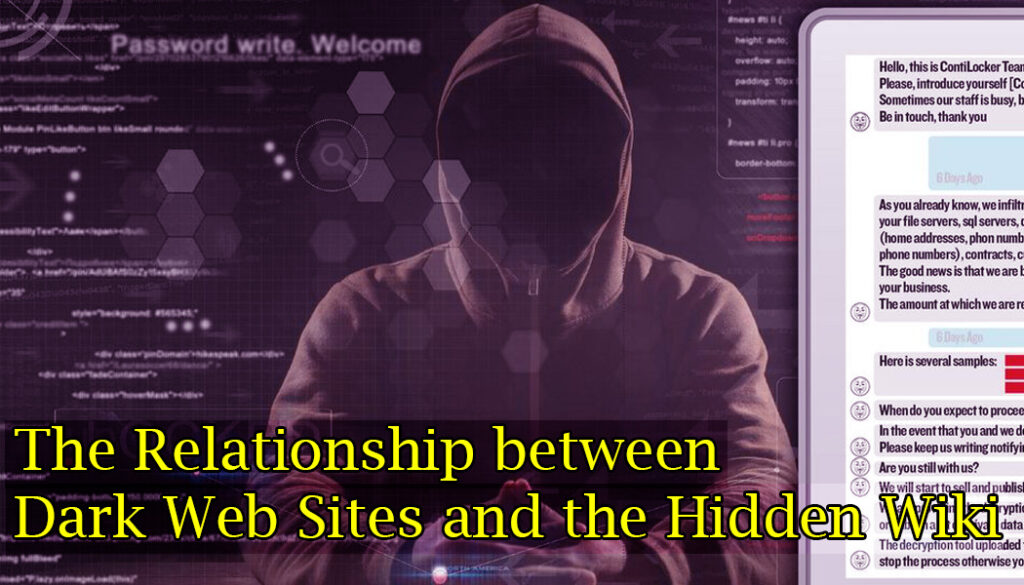
2. The Hidden Wiki
Structured Directory: The Hidden Wiki provides organized lists and categories, serving as a centralized directory to navigate the Dark Web.
Ease of Use: Users find convenience in having a single source for various links and content categories, simplifying navigation.
Limited Scope: Not all Dark Web sites are listed on the Hidden Wiki, and its content is subject to changes and updates by contributors.
Choosing Between Dark Web Links and the Hidden Wiki
Preference for Control: Users seeking specific sites or content might prefer Dark Web links for direct access to desired destinations.
Ease of Navigation: Individuals desiring structured access or those new to the Dark Web may find the Hidden Wiki more user-friendly and helpful.
Complementary Usage: Some users leverage both methods, using Dark Web links for specific searches and the Dark Wiki for broader exploration.
Leveraging the Best of Both
Deciding between Dark Web links and the Hidden Wiki largely depends on individual preferences and navigation styles. Dark Web links offer direct access to specific sites, catering to users with precise content needs, while the Hidden Wiki serves as a structured directory, aiding those seeking a curated selection of links across different categories. Optimal navigation often involves a combination of both methods, allowing users to explore the Dark Web with more versatility and depth.
How to use .onion links on the hidden wiki?
Understanding .onion Links
.onion links, exclusive to the Tor network and the Dark Web, represent a unique addressing system for websites within this encrypted realm. Here’s a guide on effectively utilizing .onion links through the Hidden Wiki:
1. Accessing .onion Links via the Hidden Wiki
a. Using the Tor Browser:
Ensure the Tor browser is installed and launched on your device. This specialized browser allows access to .onion links by routing your connection through the Tor network.
b. Entering the Hidden Wiki:
Access the Dark Wiki using its specific .onion URL. Once on the Hidden Wiki page, you’ll find categorized lists of various .onion links.
2. Navigating .onion Links Safely
a. Choose Wisely:
Exercise caution when selecting .onion links. Verify the legitimacy and reputation of websites before accessing them. Avoid suspicious or potentially harmful sites.
b. Clicking on .onion Links:
Click on the .onion link of your choice within the Hidden Wiki’s directory. The Tor browser will navigate to the specific .onion site you’ve selected.
3. Ensuring Security and Privacy
a. Maintain Anonymity:
The Tor browser maintains your anonymity by masking your IP address. Refrain from sharing personal information or revealing your identity while browsing .onion links.
b. Use Additional Security Measures:
Consider using a Virtual Private Network (VPN) alongside the Tor browser for added security and privacy layers.
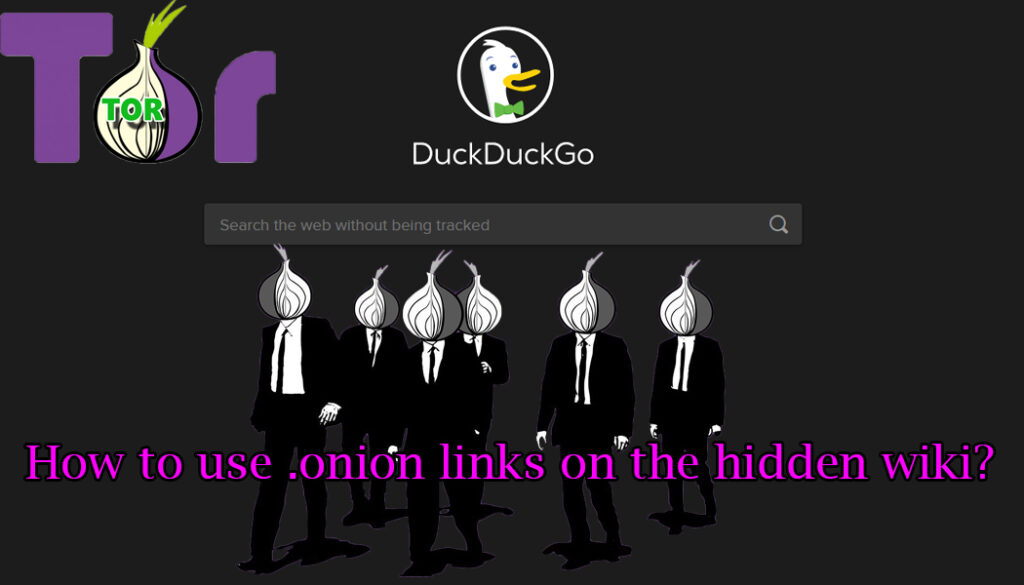
4. Understanding .onion Site Dynamics
a. Independence of .onion Sites:
.onion sites function independently of the Dark Wiki. They establish their presence within the Dark Web and can operate without being listed on directories.
b. Hidden Wiki as a Directory:
The Hidden Wiki serves as a directory, organizing and categorizing .onion links for user convenience. It simplifies navigation within the Dark Web.
Navigating .onion Links with Caution
Using .onion links through the Dark Wiki necessitates employing the Tor browser and exercising discretion while exploring the Dark Web. The Hidden Wiki acts as a valuable directory, providing a structured layout of .onion links, allowing users to traverse the Dark Web with more organization and ease. However, users should always prioritize safety and vigilance, verifying the legitimacy of .onion sites and practicing responsible browsing habits.
What is the difference between the dark web and hidden wiki?
Understanding the Distinctions: Dark Web vs. Hidden Wiki
The Dark Web and the Dark Wiki are interconnected elements within the encrypted depths of the internet, yet they serve distinct roles and possess different characteristics:
1. The Dark Web
a. Encrypted Layer of the Internet:
The Dark Web constitutes a secluded segment of the internet that operates on encrypted networks, inaccessible through conventional browsers.
b. Varied Content and Platforms:
Houses diverse websites, forums, marketplaces, and services, both legal and illegal, emphasizing anonymity and privacy for users.
c. Requires Specialized Access:
Accessible via specialized software like the Tor browser, facilitating anonymity by rerouting internet traffic through multiple nodes.
2. The Hidden Wiki
a. Directory within the Dark Web:
Functions as a directory or guide providing categorized links to various websites and resources existing within the Dark Web.
b. Organized Links and Resources:
Offers a structured layout, categorizing sites into different sections, simplifying navigation for users exploring the Dark Web.
c. Centralized Information Hub:
Acts as a centralized resource to discover and access different types of content available within the Dark Web.
Differences between the Dark Web and Hidden Wiki
a. Function:
The Dark Web represents the encrypted network housing a multitude of websites and services, while the Hidden Wiki serves as a directory providing links to these sites.
b. Content Scope:
The Dark Web encompasses a wide array of content, legal and illegal, while the Dark Wiki primarily organizes and categorizes these links for user navigation.
c. Accessibility and Purpose:
Access to the Dark Web requires specialized software, emphasizing anonymity and privacy, whereas the Hidden Wiki aims to simplify navigation within this encrypted realm.
Interconnected Components of the Dark Web
The Dark Web and the Hidden Wiki form interconnected parts within the encrypted landscape of the internet. While the Dark Web hosts diverse content and services, the Dark Wiki acts as a guide, organizing links to facilitate easier navigation and access to this secluded realm. Understanding these differences is vital for users navigating the complexities of the Dark Web and utilizing resources like the Hidden Wiki as a gateway to its content.
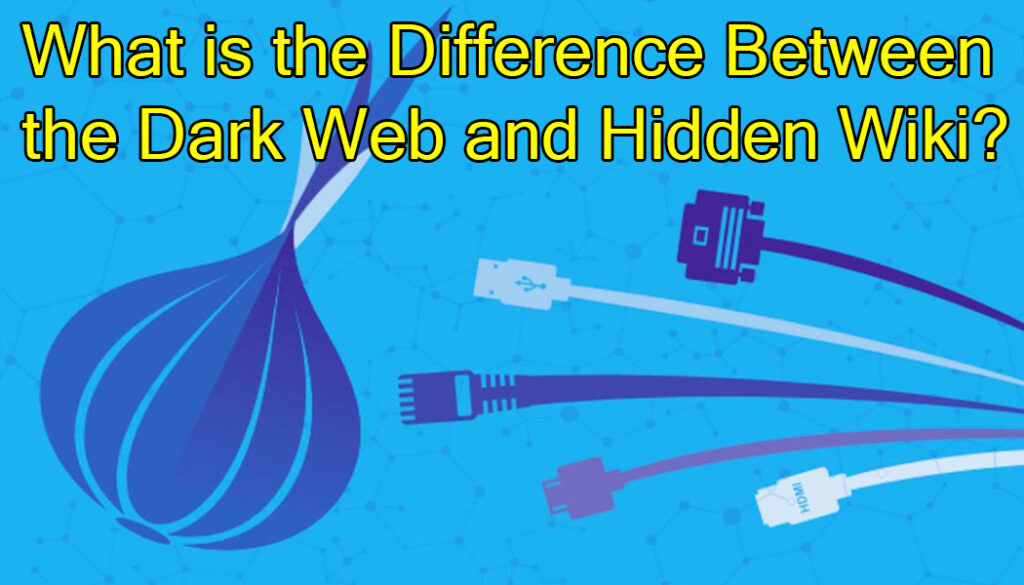
What things do you have to avoid on the Hidden Wiki?
Navigating the Dark Wiki, like any part of the Dark Web, demands caution and discretion to avoid potential risks. Here are some crucial aspects to avoid while exploring the Hidden Wiki:
1. Illegal Activities
– Engaging in Illegal Transactions:
Avoid accessing or participating in sites offering illegal goods or services, such as drugs, weapons, counterfeit documents, or illegal content.
2. Scams and Fraud
– Phishing Sites and Scams:
Refrain from clicking on suspicious links or providing personal information to sites that might be phishing attempts or fraudulent schemes.
3. Malicious Content
– Malware and Viruses:
Exercise caution to avoid sites that could potentially host malware, viruses, or malicious software capable of compromising your device or data.
4. Unverified Sources
– Links with No Verification:
Be wary of links lacking verification or credibility. It’s advisable to research and confirm the legitimacy of websites before accessing them.
5. Explicit or Disturbing Content
– Graphic or Illegal Content:
Avoid accessing sites containing explicit or illegal content that might have adverse psychological effects or violate legal boundaries.
6. Unprotected Communication
– Revealing Personal Information:
Refrain from sharing personal or sensitive information, as anonymity is crucial while exploring the Dark Web, including the Hidden Wiki.
7. Inadequate Security Measures
– Using Unsecured Connections:
Always use the Tor browser and consider utilizing additional security measures like VPNs to enhance privacy and security.
Vigilance Is Key
Navigating the Hidden Wiki necessitates a vigilant and discerning approach. Avoiding illegal activities, scams, malicious content, unverified sources, and explicit material, and safeguarding personal information are critical precautions. Prioritizing security measures and exercising caution while exploring the Dark Wiki or any part of the Dark Web ensures a safer browsing experience within this encrypted realm.
Why do people use the hidden wiki?
The Hidden Wiki, despite being part of the enigmatic Dark Web, serves various purposes that attract users seeking specific advantages:
1. Anonymity and Privacy
– Protection of Identity:
Users leverage the Hidden Wiki to maintain anonymity while accessing information, communicating, or engaging in activities within the Dark Web.
2. Access to Restricted Information
– Uncensored Content:
The Hidden Wiki provides access to information that might be restricted or censored on the surface web, offering a platform for free expression.
3. Exploration and Curiosity
– Discovering the Unseen:
Curiosity drives users to explore the Dark Web’s hidden corners through the guidance of the Dark Wiki, uncovering content not available on conventional platforms.
4. Privacy Advocacy and Security
– Advocacy for Digital Rights:
Individuals passionate about digital rights, cybersecurity, and privacy advocacy use the Dark Wiki to access resources and engage in discussions.
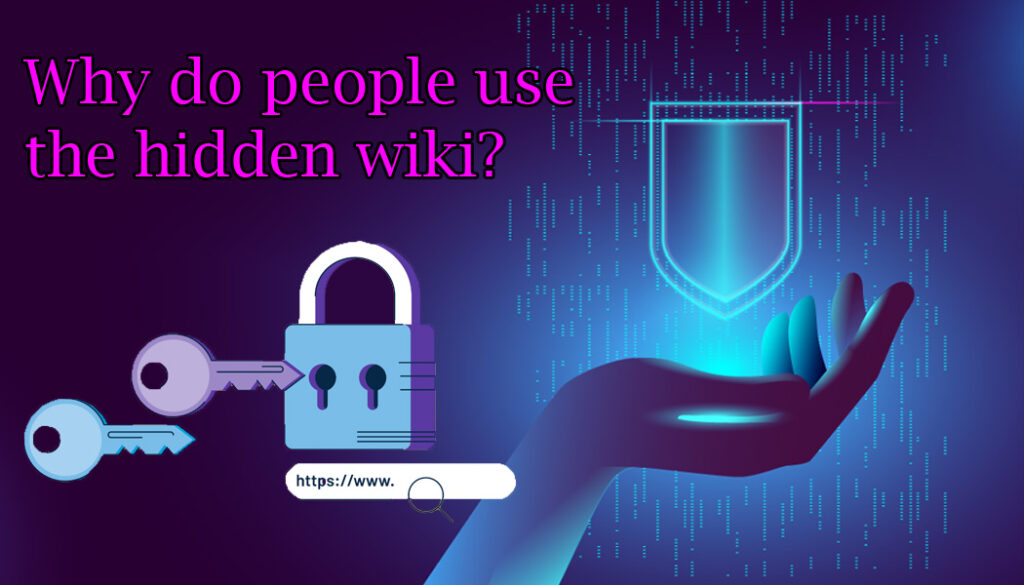
5. Research and Information Retrieval
– Research Purposes:
Researchers, journalists, and academics utilize the Dark Wiki to gather information or conduct studies on various subjects, especially those related to the Dark Web.
6. Access to Specific Services
– Seeking Services or Goods:
Users visit the Hidden Wiki to find specific services or goods available within the Dark Web, exploring marketplaces and forums offering various items.
7. Communication and Networking
– Engaging with Communities:
Some users join forums or communities linked through the Dark Wiki to communicate, share knowledge, or seek advice on diverse topics.
Diverse Reasons for Exploration
The Hidden Wiki serves as a gateway for individuals with various motivations, including anonymity, accessing restricted information, exploring the unseen, advocating for privacy, conducting research, seeking specific services, or engaging in communities. Understanding these motivations provides insight into why people navigate the Dark Web using resources like the Hidden Wiki, each driven by their distinct interests and objectives within this encrypted realm.
Why is the hidden wiki very dangerous for new users?
The Hidden Wiki, while providing access to a breadth of content, can be particularly perilous for newcomers due to various inherent risks:
1. Lack of Familiarity
– Navigational Complexity:
New users might find the structure and navigation of the Dark Web, facilitated by the Hidden Wiki, confusing or overwhelming, leading to inadvertent clicks on harmful links.
2. Exposure to Illicit Content
– Unintended Access to Illegal Content:
Inexperienced users may inadvertently stumble upon illegal or explicit material while exploring the Dark Wiki, leading to legal repercussions.
3. Cybersecurity Threats
– Increased Vulnerability to Malware:
New users might lack awareness of potential malware or phishing attempts on the Dark Web, risking the compromise of personal devices or sensitive information.
4. Scams and Fraud
– Susceptibility to Scams:
Lack of experience makes new users more susceptible to falling victim to scams or fraudulent schemes prevalent within the Dark Web.
5. Psychological Impact
– Exposure to Disturbing Content:
Inexperienced users might encounter explicit or disturbing content on the Hidden Wiki, potentially leading to psychological distress.
6. Legal Implications
– Unintentional Engagement in Illegal Activities:
Due to unfamiliarity, new users might unintentionally engage in activities that breach legal boundaries, risking legal consequences.
7. Lack of Safety Measures
– Inadequate Security Measures:
Novice users might overlook or underestimate the importance of security measures, leaving themselves vulnerable to privacy breaches or identity exposure.
Caution for Newcomers
For new users, the Hidden Wiki can pose significant risks due to the complexities of the Dark Web, potential exposure to illicit content, cybersecurity threats, susceptibility to scams, psychological impact, legal ramifications, and inadequate safety measures. Navigating the Dark Wiki demands vigilance, discretion, and a thorough understanding of the risks to ensure a safer exploration of the Dark Web’s concealed corners. Advising new users to prioritize caution and education before delving into this encrypted realm is crucial to mitigate potential dangers.
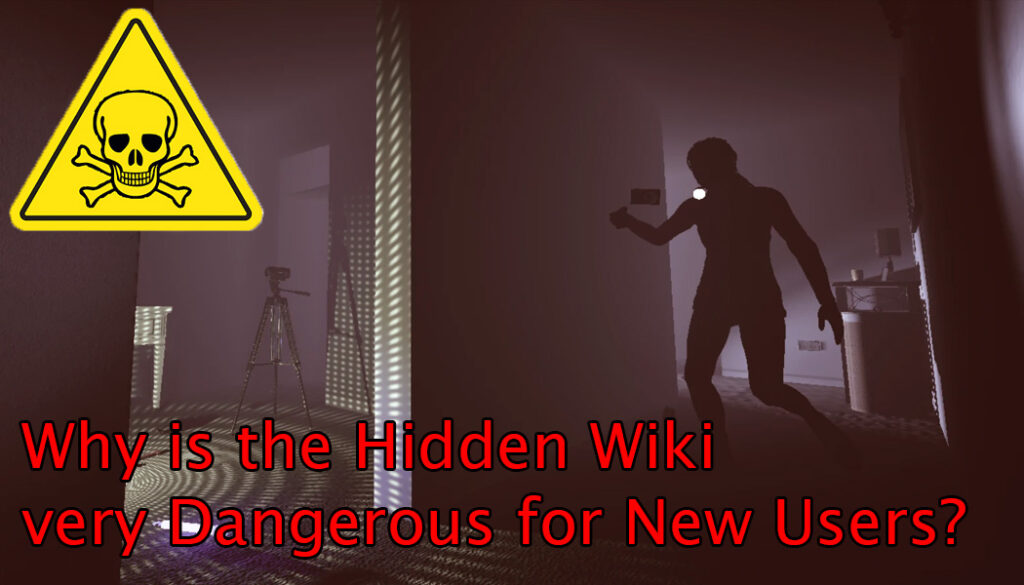
Pros and Cons of Navigating the Hidden Wiki
The Hidden Wiki offers both advantages and disadvantages for users venturing into the depths of the Dark Web:
Pros:
1. Gateway to Diverse Content:
Provides access to a wide range of websites, forums, marketplaces, and resources within the Dark Web, facilitating exploration of varied content.
2. Structured Navigation:
Organizes links into categories, making navigation more manageable and enabling users to explore different sections of the Dark Web conveniently.
3. Anonymity and Privacy:
Offers a platform for users seeking enhanced privacy and anonymity while accessing information or communicating within the encrypted realm of the Dark Web.
4. Access to Restricted Information:
Allows access to information that might be restricted, censored, or not readily available on the surface web, fostering free expression and information sharing.
5. Resource for Researchers and Advocates:
Serves as a valuable resource for researchers, journalists, privacy advocates, and academics conducting studies or exploring topics related to the Dark Web.
Cons:
1. Potential Exposure to Illicit Content:
Navigating the Hidden Wiki increases the risk of inadvertently accessing illegal or explicit material, leading to potential legal consequences.
2. Cybersecurity Threats:
Users face the risk of encountering malware, phishing attempts, or other cyber threats while exploring the links provided within the Hidden Wiki.
3. Scams and Fraudulent Activities:
Users may fall victim to scams, fraudulent schemes, or phishing sites, especially when inexperienced or unaware of the risks within the Dark Web.
4. Psychological Impact:
Exposure to disturbing or explicit content on the Dark Web, facilitated by the Hidden Wiki, can have adverse psychological effects on users.
5. Legal Implications:
Inadvertent engagement in illegal activities or accessing illegal content through the Dark Wiki can lead to potential legal repercussions for users.
Balance of Risks and Opportunities
While the Hidden Wiki provides a structured gateway for exploration within the Dark Web, offering access to diverse content and enhanced privacy, it also exposes users to potential risks. Navigating the Hidden Wiki demands a cautious approach, considering both its advantages and disadvantages, to ensure a safer and more informed exploration of the Dark Web’s encrypted terrain.
